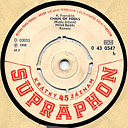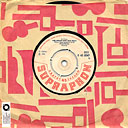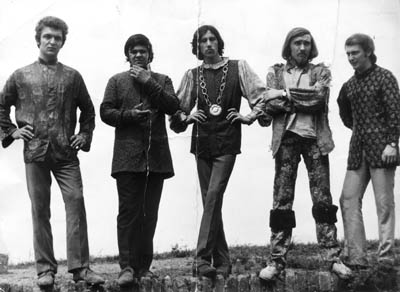Komety – Chain Of Fools
from 7 inch single, 1968, Supraphon 0430547; also on 7 inch EP Artia/Supraphon 133043


original SP (a-side/b-side in a generic Supraphon sleeve)
This one is a true gem and probably the first Czechoslovak recording that really deserves the adjective “funky”. Don Covay’s composition Chain Of Fools was a huge hit all over the world, especially the 1967 version by Aretha Franklin which will still shake up any dancefloor even these days. In the 1960s many people in Czechoslovakia were secretly listening to Radio Luxembourg, thus it didn’t take very long until these chains hooked all “fools” behind the Iron Curtain as well. The most popular Czech rendition was surely the one by Marie Rottrová & Flamingo from their 1970 debut album and its later English export version This Is Our Soul respectively. And suprisingly, Flamingo already had this song on an LP before: a live cut that appeared in 1969 on the 2nd Czechoslovak Beat Festival 1968 compilation. That version was sung by Rottrová’s predecessor though, the young Hana Zagorová, who was then desperately trying to find a trace of soul in her rather thin voice.
Komety (The Comets) were the first Czechs who recorded it, however, and they did best by far in my opinion, with a mean and lowdown beat and lots of dirty fuzz guitar. The group was one of the legends of early Czechoslovak rock’n’roll and beat music. Among the founding teenage members were the guitarists Jiří Kaleš and Jan Reiner as well as the future Matadors organist Jan Obermajer (later known as Jan Farmer Obermayer) who used to blow the clarinet and the saxophone. They played their first gig on a 1959 (!) New Year’s Eve party in a Prague restaurant for which they had kidnapped Obermajer’s parents’ tube radio receiver and used it as an amplifier to plug in their home made “electric” guitars. The first years they played a lot of pub dance parties in Prague, thus their repertoire consisted of rock’n’roll and R&B hits as well as many popular dixieland standards; they also used to have a bunch of horn players. The fluctuation of the group members was immense in the first half of the decade. Like most Czechoslovak young men, also Kaleš and Reiner were forced to make a two-years break when they got drafted. But Komety kept on playing and they seemed to act as a good school for quite a number of teenagers who were about to become respected Czech rock musicians in the future: Radim Hladík, Jiří Helekal, Miroslav Žižka, Vladimír Mišík or another future Matador, Otto Bezloja, who was obviously one of the first in the country to play strictly on an electric bass guitar instead of the commonly used double bass or cello.
Unfortunately, Chain Of Fools, falsely credited to A. Francklin [sic] on the label, was the only vinyl that the group recorded in the sixties. The exact recording date seems unclear. While one source believes it was in late 1967, another one lists June 1968; the latter seems less likely to me though. Nevertheless, both possible dates fit to the era when R&B and soul began to spread over the Czech music scene. Kaleš and Reiner found the perfect frontman for that new “craze” in the legendary ex-Hell’s Devils singer Miloš Vokurka alias Reddy Kirken (not to be confused with a similarly named Czech pop group of the 1990s). At the drums still sat Miroslav Žižka who would soon move on to Apollobeat. Depending on the recording date, the bass was played either by Ivan Pešl or by Pavel Pešta who came in the first half of 1968 when Komety traded their bass player with the psychedelic Primitives Group. As for the b-side of the single, The House That Jack Built is a nice Alan Price cover but compared to the Chain it’s nothing earth-shaking. (Coincidentally, Flamingo and Rottrová later also recorded a song with the same name, albeit the completely different and funkier one from Aretha Franklin’s repertoire.)

Komety de facto disbanded in the summer of 1968 when Reddy left to replace Viktor Sodoma as the Matadors’ lead singer. Matadors (without Hladík and Obermajer though) then left Prague for a lucrative job in Munich, West Germany, to perform and record a German version of the musical Hair. Kaleš and Reiner continued as the New Comets with Vladimír Mišík taking over the lead vocals, but the timing wasn’t all that great due to the invasion of the Warshaw Pact armies in August 1968. The New Comets quitted before they even appeared in the public. Kaleš with Reiner switched to the “safe side” and became members of František Ringo Čech’s Shut Up orchestra, one of the Semafor Theatre’s house bands. Reddy on the other hand remained in Germany with the rest of the new Matadors crew including Bezloja. Later they were the founding members of the legendary international brass-rock combo Emergency, whose first drummer was the talented young German jazz-rocker (and vastly untalented yet eventually later enormously successful solo singer) Udo Lindenberg.
Komety sort of reincarnated in 1973 when Kaleš, Reiner and Obermajer (who was then an ex-George & Beatovens) got together again. As far as I can vaguely remember from my childhood days, that edition inclined more to pop music. But who in fact didn’t in those days…? That period has been documented on four singles, one of them was a popular cover version of Les Humphries’ Mexico. Komety disbanded for good in 1977. Their last lead singer supposedly was a certain guy named Michal Prokop…
(Credit for parts of the biography and trivia goes to the extensive Czech online article at popmuseum.cz, which itself is a transcript from a Rock&Pop 8/1996 magazine article by Aleš Opekar. The photo, the hint about Emergency and a couple of other details courtesy of my friend, neighbor and former Matadors roadie Josef Voříšek.)

Pingback:Interlude: The Matadors’ secret tracks – Funky Czech-In
Pingback:Shotgun – Funky Czech-In
Pingback:Emporium of the world – Funky Czech-In
Pingback:Bafff – Funky Czech-In